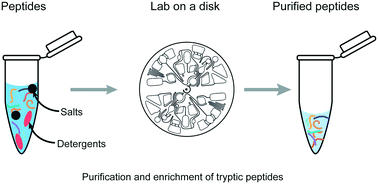Automation of peptide desalting for proteomic liquid chromatography – tandem mass spectrometry by centrifugal microfluidics†
Abstract
For large-scale analysis of complex protein mixtures, liquid chromatography – tandem mass spectrometry (LC-MS/MS) has been proven to be one of the most versatile tools due to its high sensitivity and ability to both identify and quantify thousands of proteins in a single measurement. Sample preparation typically comprises site-specific cleavage of proteins into peptides, followed by desalting and concomitant peptide enrichment, which is commonly performed by solid phase extraction. Desalting workflows may include multiple liquid handling steps and are thus error prone and labour intensive. To improve the reproducibility of sample preparation for low amounts of protein, we present a centrifugal microfluidic disk that automates all liquid handling steps required for peptide desalting by solid phase extraction (DesaltingDisk). Microfluidic implementation was enabled by a novel centrifugal microfluidic dosing on demand structure that enabled mapping multiple washing steps onto a microfluidic disk. Evaluation of the microfluidic disk was performed by LC-MS/MS analysis of tryptic HEK-293 eukaryotic cell peptide mixtures desalted either using the microfluidic disk or a manual workflow. A comparable number of peptides were identified in the disk and manual set with 19 775 and 20 212 identifications, respectively. For a core set of 10 444 peptides that could be quantified in all injections, intensity coefficients of variation were calculated based on label-free quantitation intensities. The disk set featured smaller variability with a median CV of 9.3% compared to the median CV of 12.6% for the manual approach. Intensity CVs on protein level were lowered from 5.8% to 4.2% when using the LabDisk. Interday reproducibility for both workflows was assessed by LC-SRM/MS analysis of samples that were spiked with 11 synthetic peptides of varying hydrophobicity. Except for the most hydrophilic and hydrophobic peptides, the average CV was lowered to 3.6% for the samples processed with the disk compared to 7.2% for the manual workflow. The presented centrifugal microfluidic DesaltingDisk demonstrates the potential to improve reproducibility in the sample preparation workflow for proteomic mass spectrometry, especially for application with limited amount of sample material.



 Please wait while we load your content...
Please wait while we load your content...